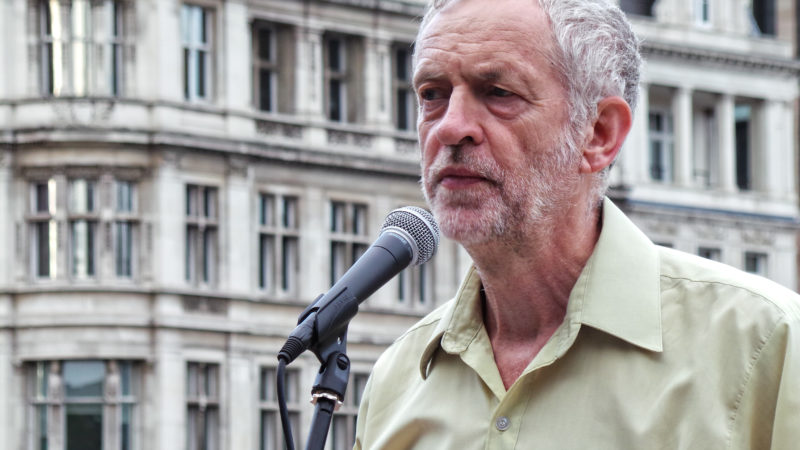First Past the Post means leaders play it safe rather than choosing a position

Last week, Radio Four’s PM programme got a couple of the longest serving parliamentarians, Ken Clarke and Norman Lamont, in to do the inevitable “are politicians worse than they used to be?” slot.
Credit to Clarke, he pointed out that was what the old-timers had been saying back when he was a mere first-time MP.
But there’s no doubt that the extreme weakness and dysfunction of British politics has been exposed by the Brexit crisis.
The New York Times has a cutting piece pointing out just how long this has continued, and how much others have suffered from it.
With a theory of history – and certainly journalism – all too often dominated by individualism, it’s hardly surprising that the people at the top have taken a massive weight of abuse for their failings.
And they certainly can’t escape all of the responsibility.
But it has struck me, watching Jeremy Corbyn twist, turn, and dash off to Hastings for a non-existent election while the nation is in desperate deadlock over Brexit, that there’s someone he reminds me of, who I got to see operating at close hand in 2015. That’s Ed Miliband.
There’s a reason why commentators with their own agendas have been able to claim that Labour was far too leftwing or too rightwing to win that election: Miliband and his Shadow Cabinet were collecting trying to please everyone while not offending anyone.
They were waiting for the government to fall into their lap, just so long as they were innocuous enough.
That’s an understandable approach – deployed to great electoral result for several elections by Tony Blair – in a first-past-the-post electoral system in which swing voters in a handful of seats can and often do determine the result.
By definition, being swing voters between Labour and Tory, they tend to be middle of the road, and that’s where generations of politicians have been planting themselves.
For Corbyn, it is about Brexit not economics, but he’s in a similar position, with his MPs who occupy many “safe seats” (and those won in 2017) that are on radically opposite sides of the issue.
He’s been trying to occupy the middle of the road, not expressing his true beliefs, or being pinned down to any clear position, in the hope of not offending either side.
That’s a pretty uncomfortable position for a conviction politician and one that the Miliband case suggests is unlikely to deliver the keys to No 10.
But it is what our electoral system dictates.
By contrast in a proportional voting system, one where voters have a range of parties to choose from with every vote going towards electing an MP, there’s more benefit to be gained from stating what you believe in and seeking to persuade potential voters of its value, than in trying not to offend anyone and fall into office.
When we turn to Theresa May, well she clearly arrived in the prime ministership grossly unprepared with the skills and capacities needed for the job, and without having been tested in the basics of political debate.
How she got there is in part historical accident – the collapse of the Johnson and Gove runs and being left with the lame duck Leadsom who pulled out before the vote – but also a product of her having been elected as MP in 1997 in a safe seat, one never held in its current or previous forms by anyone but a Conservative.
May’s never, until 2017, had to personally contest a meaningful election.
“Safe seats” like this are another by-product of the first-past-the-post electoral system. Jacob Rees-Mogg is another recipient of such institutional largesse.
We’re all bearing the expense of this system.
In 2016 a narrow majority of voters voted to “Take Back Control”. No wonder, when it is clear that even our political leaders are forced by the system into dishonest, disastrous positions.
The problem isn’t the individuals, but the system. Unless we change that, the extreme dysfunction will only continue and, if it can be imagined, worsen.
Any campaign setting out a vision for the future has to present at least a vision, a way forward for dealing with that, as well as settle our future relationship with Europe.
And in the meantime, if there is an election in the near future, there’s an opportunity to break the mould.
Voters could demand change by only voting for candidates committed to fixing this hopelessly outdated, dysfunctional system. Demand candidates not just making vague expressions of support, but pledging to back and campaign for the UK to become a democracy. It is in your hands.
Natalie Bennett is former leader of the Green Party and writes regularly for Left Foot Forward.
Left Foot Forward doesn't have the backing of big business or billionaires. We rely on the kind and generous support of ordinary people like you.
You can support hard-hitting journalism that holds the right to account, provides a forum for debate among progressives, and covers the stories the rest of the media ignore. Donate today.



